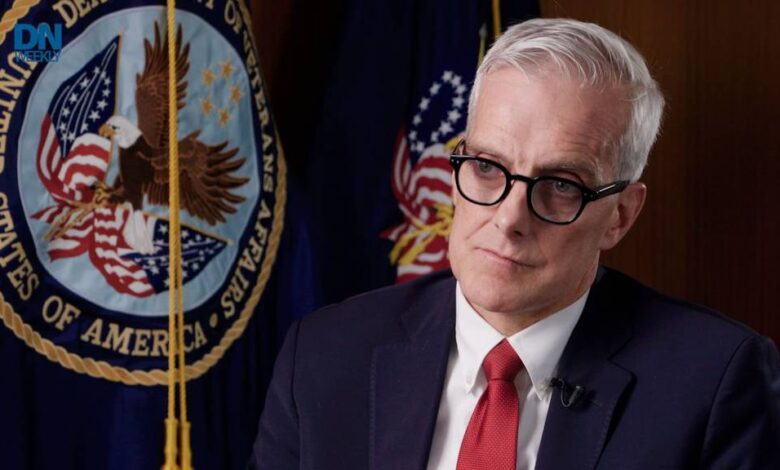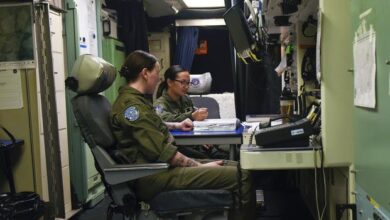McDonough wants VA to reach ‘every veteran in the country’

Veterans Affairs leaders reported record-high levels of benefits applications and health care appointments last fiscal year, but department Secretary Denis McDonough is still aiming for more engagement with veterans.
“My goal is that we have a relationship with every veteran in the country,” McDonough told Military Times. “[This administration] has set a simple, straightforward goal that there will be more vets in our care when we leave than when we started.”
Thanks in large part to legislation like the Promise to Address Comprehensive Toxics Act — better known as the PACT Act — VA appears to be on its way to that goal. According to department data, in the last 14 months, more than 667,000 veterans have applied for new benefits related to military toxic exposure illnesses, and nearly 198,000 veterans have signed up for expanded health care coverage.
Now the challenge for McDonough, the longest-serving VA secretary in the last nine years, is to make sure his department is ready for that increased workload. That has meant an uptick in hiring in recent months, the largest budget request in department history ($320 billion for fiscal 2024) and more scrutiny from Capitol Hill on the size and scope of the department.
“I don’t think there’s a risk that all of the sudden we’re too big,” he said. “There are veterans who need access to health care. There are veterans who need access to mental health care. And we want to make sure that they know we’re here for them and that they can get care with us.”
In a wide-ranging interview ahead of Veterans Day celebrations this week, McDonough shared his plans for the coming year and the challenges they present.
Portions of this interview have been edited for length and clarity.
Military Times: You’ve talked about the records you’ve set in claims processing and health care outreach last fiscal year. Is there a concern that VA is growing too fast? Can its systems keep up?
McDonough: We meant it when we said we wanted the PACT Act to be passed and implemented. We meant it because we really want vets to be in our care. And so there’s no doubt that having more vets in our care, having more vets file claims, having more vets getting benefits, that means additional challenges for us, but I consider those high-class problems.
We set out this year anticipating there was going to be a challenge on claims processing. We started in September 2021 using expiring funds to increase hiring at VBA, and we’ve only continued that since. Anticipating that we were going to have more vets in VHA care, last year, after the president signed the PACT Act, we made FY2023 a year of hiring. We wanted to hire roughly 52,000 people. We hired more than 61,000.
So, I consider it a high-class problem if more veterans are coming in wanting to have a relationship with us.
Military Times: You’ve hired more benefits processors but the benefits backlog continues to rise. How do you manage your message that VA is in a better place for processing benefits, but it’s going to look worse for a while?
McDonough: It doesn’t matter what we say. It matters what the veteran experience is.
We have veterans who are getting their claims resolved quickly, but maybe not getting every part of their claim resolved. So, if we can start resolving pieces of that and start getting veterans their benefits, even while we resolve the other pieces, the quality of life that that veteran is experiencing improves. We want the veteran experience to drive people’s expectations.
We are going to continue hold ourselves to accountable. … We’re not saying, “Hey, we’re doing great, we’re doing poorly.” We’re saying, “Here’s where we are. You guys be the judge.”
At the end of the day, what we say we’re doing is not that important. What veterans are telling us that they’re experiencing — that’s what’s important.
We have to resolve claims more quickly. We have to be in constant contact with vets. And they can’t just be sending their claims into a black hole and never hearing back from us.
RELATED
:quality(70)/cloudfront-us-east-1.images.arcpublishing.com/archetype/7WWPB7RCIRGNTK6BATMZ7ON3DE.jpg)
Military Times: It feels like the relationship with Congress is becoming strained, on the issue of abortion in particular. Why haven’t you provided all of the information the House Veterans’ Affairs Committee has requested on the issue?
McDonough: I feel like we’ve made good progress on that. But I think there are two principles at play here. You’ve heard me say this since the day I started that oversight by our members of Congress, our committees, that makes us better, not worse. But a veteran has a relationship with her doctor. That relationship is very important. I feel duty bound to protect that relationship.
So far we’ve been able to manage those two principles. But I also know that if it comes to a point — we’ve not reached it yet — where those two principles are in conflict, I have to protect our clinicians’ relationship with veterans. Veterans come to VA with that expectation.
Military Times: We’re entering an election year. Do you worry that veterans issues will be politicized on the campaign trail?
McDonough: My commitment to everybody on Capitol Hill is that they’re not going to be surprised by what we’re doing. They won’t always agree with what we’re doing, but they’ll understand why we’re doing it. What they do with that information is entirely up to them. As long as we’re operating with that kind of transparency and openness then I think all this stuff will be manageable.
I want none of our veterans to worry that somehow our clinicians, our providers, our claims readers are going to be distracted by politics. They know who they work for: veterans. They know they need to carry out those policies, those procedures, those decisions, and that’s what they’re going to do. They should not be distracted by political fights. The politics will be what they’re going to be.
Military Times: When we sat down a year ago, there were a handful of issues that we brought up that have not been resolved. The electronic health records system overhaul is a big one. You announced a major pause in the program earlier this year. There are concerns on Capitol Hill that this seems like a road to nowhere.
McDonough: [Former National Security Adviser] Gen. James Jones, who was my boss, used to say, “If you want it bad, you get it bad.” I want the new records system in the worst way, but we know we’ve got to get it right.
So, where we are is we are doing everything we can in the five sites where we’ve already gone live to prove the concept. And we won’t move on to additional sites — aside from the one joint VA-Defense Department site in Chicago next March — until we prove the concept works. And that’s consistent with our philosophy on modernization that says, “Let’s not buy the dream, let’s build the capacity.”
I think we got over our skis in the first five sites. Some of that had to do with the pandemic, some of it had to do with additional challenges. We’re going to get those five sites right before we move on.
RELATED
:quality(70)/cloudfront-us-east-1.images.arcpublishing.com/archetype/OZ73HMPSTRBYFHWQLPPVWBRACU.jpg)
Military Times: We also talked last year about VA’s new caregivers policy, which has been lingering. Should families expect something soon that clarifies or moves the issue ahead?
McDonough: I just had a chance to travel with the program lead for the Program of Comprehensive Assistance for Family Caregivers, and I just met with four amazing caregivers in New Orleans last Friday.
Yes, there is some frustration. But we gave ourselves until September 2025 to make sure that we get this right. We’re using that time now. I think it’s fair to say that our caregivers are hearing from us along the way. And when we have news to get out there, in terms of the rules modification for caregivers going forward, we’ll make sure everybody’s aware of that.
We’re not going to rush it. We’re not going to move until we have the feedback from the participants in the program, because we tried to move out too quickly earlier. We learned that as many as 90% of legacy participants were being moved after the program under the last rules change. That wasn’t the intent of Congress. It surely wasn’t the expectation of the president. So, we’re not going to do that. We have to figure out how to get this right.
Military Times: VA transgender services are under attack from House Republicans in their appropriations bills. We’re several years out from your initial announcement that VA would start providing transgender surgery services. It still has not moved forward.
McDonough: We announced in summer of 2021, just over two years ago … and the next step will be a notional set of rules for how we’ll do that. That’s how we add services to the suite of services we provide. And that next step is with me.
As the person who called for this and as the person who will be defending the policy when we do it, when I’m ready to move ahead , I’ll do it. This is an important suite of care to vets. When the President asked me to take this job, he told me to fight like hell for veterans. He didn’t say just straight veterans. He said fight like hell for all veterans. That’s what I’m going to do.
RELATED
:quality(70)/cloudfront-us-east-1.images.arcpublishing.com/archetype/MQKWT3A77ZCWHE5AYIK5UKZF4Q.jpg)
Military Times: You made a big announcement earlier this year on changing the VA motto to gender-neutral language. The old motto is still on a large plaque outside this building. When will the visible change actually happen?
McDonough: It’s not just a symbolic thing. It’s having the women veterans, veterans who felt like they weren’t included before, being able to walk in and see that there is a change in VA.
So the first and most important thing we have to communicate is that VA is a place where women veterans are seen and are heard, where all veterans are seen and are heard. I think women veterans are feeling that. As I said earlier, the veteran experience drives our efforts. We can talk all we want about what we want to do and what we believe, but until the veteran experiences that to be true, it doesn’t matter. I think women veterans are beginning to feel that now.
Is it perfect? Absolutely not. But when I travel around, I am hearing from individual veterans that access is changing. There’s better access to mammography, better access to OB/GYN care, more access to reproductive health services. That’s the first and most important thing.
We have communicated this across our system. The last step is changing the few examples of this on the outside of buildings, including here at VA headquarters. We’ll do that.
Military Times: During a speech at the Press Club earlier this week, you said you’re already engaged in some outreach for troops who suffered injuries overseas during recent attacks in the Middle East. In the past, VA hasn’t always been that quick in looking ahead. How do you prepare for the needs of veterans after the next major conflict?
McDonough: [Under Secretary of Benefits] Josh Jacobs saw that story yesterday and made it required reading for his team. And he got everybody working on that. Hats off to him for making sure that we’re out there reading everything, so that when we find something that we can move on, we move on it.
I think the most important thing we can do is to make sure that we perform with excellence in the assignments we have today, so that vets trust us tomorrow. I think VA as a general matter does respond well to new challenges. The signature injury of Vietnam was post-traumatic stress. That was also a signature injury of the wars in Iraq and Afghanistan, as well as depression. VA as a health care system reacts well to those.
The issue is whether our veterans trust us. We need to hear them and to be responsive, to build our programs into their lives rather than expecting them to drop everything and come to us.
In the late 1970s, veterans were saying they wanted to get more mental health care, but they wanted to go somewhere without the hassle. So they built vet centers. That was a major effort for us to start to build our programming into veterans’ lives. That has to be true across the board. We’ll make sure that we catch up with the signature issues of a particular conflict. What we need is the trust of the veterans, caregivers, survivors, family members so that they’ll come in.
Military Times: Where are we in the process of looking at adding more presumptive conditions related to burn pits, looking at expanding care for all military toxic exposures?
McDonough: We’re doing two things. One, we’re taking the conditions that are included in the PACT Act and we’re breaking those down into component parts. So, when you look at the number of conditions covered, it’s not just the list of 23 or so that are there, but its sub-conditions that our processes have not caught up to yet. That’s hundreds of conditions being presumed service connected.
The second thing we’re doing — we recently published a list of rare cancers that are subject to an interim final rule that we stood up about a year ago. We’ve now finalized that rule. That’s permanent.
The third thing we’re doing is we are constantly looking for any new indications of illnesses that may be connected. I don’t have any announcements for this. But this is a really important piece of the PACT Act, because we shouldn’t have to wait for Congress to act. We should be able to do that ourselves. That process is up and running.
Military Times: I’ve heard from quite a few veterans who have said they don’t want to apply for benefits or fear they’re taking them away from someone who needs them more if they do. What is your message to those folks?
McDonough: The warrior ethos that so many of our veterans personify is such an admirable thing. The way they’ve lived their lives is to constantly look out for somebody else. And their instinct is to think, well, somebody else needs it more than I do.
So, the first and most important thing we can do is to execute on the assignments we have. We have to make sure that the veterans who file their claims get a timely answer. You have to ensure those veterans who have enrolled with us can get into health care in a timely manner. When that happens, that will increase trust.
Point two — sometimes the hardest thing is to do for yourself what you do for others. We just did Buddy Check week, a really awesome thing the American Legion got everybody focused on, and then all veterans service organizations got on board. They had vets checking in on other vets. Now, that act is really important. But sometimes it also shows that vets are willing to help others more than they’re willing to say, “Hey, I might need help myself.”
So, when we execute well, that will make it easier for others to come in.
Third, and I can’t underscore this strongly enough, the way we understand individual veterans’ experience is strengthened by the more we know about his or her unit. So every veteran that files a claim helps give us a more complete picture of that unit’s experience.
So, even those veterans who don’t intend to use what they qualify for, just the act of filing might help the battle buddy. I’d urge them to please consider that.
Lastly, a lot of our vets are very sophisticated users of health care, so they only come to us for certain things. Maybe they only come to us for our mental health care. Maybe they only come for our pharmaceutical services. Maybe some of them only come for eyeglasses, or for audiology. But once you’re in the VA, you’re in for good. So, you may not need it all now, but it sets you up five, 10, 20 years from now.
Leo covers Congress, Veterans Affairs and the White House for Military Times. He has covered Washington, D.C. since 2004, focusing on military personnel and veterans policies. His work has earned numerous honors, including a 2009 Polk award, a 2010 National Headliner Award, the IAVA Leadership in Journalism award and the VFW News Media award.





